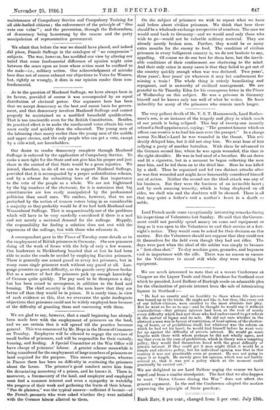We are much interested to note that at a recent
Conference at Glasgow on the Liquor Trade and State Purchase for Scotland over which he presided, Lord Balfour of Burleigh made an admirable plea for the elimination of private interest from the sale of intoxicating liquors in Scotland :—
" He had no enmity and no hostility to those whose life interest was bound up in the trade. He might not like it, but they, like every ont of our fellow-citizens, were entitled to the most absolute fair play. But he went so far as to say—and he thought he would say it without contradiction—that private interest had been at the root of nearly every difficulty which had met those who had endeavoured to get reform in the matter of liquor and its sale. He did not care whether in the abstract a man was in favour of restriction, of local option, of the shorten- ing of hours, or of prohibition itself, but whatever was the reform on which he had set his heart, he would find himself before he went very far up against the difficulty of private interest. He would go some lengths with those with whom perhaps he did not wholly agree, and say that even in the case of prohibition, which in theory was a teemating policy, they would find themselves faced with the great difficulty of private interest. If they could get it mon might think it would be a simple and effective policy, but his individual opinion was that in this country it was not practicable even at present. He was not going to argue it at length. He merely gave his opinion, which was not hastily arrived at, that it was not a policy which at the moment could practically be carried out."
.
We are delighted to see Lord Balfour urging the course we have urged,and from a similar standpoint. The fact that we also happen to want " Down Glasses during the War " does not affect the general argument. In the end the Conference adopted the motion approving the principle of .State purchase.


































 Previous page
Previous page